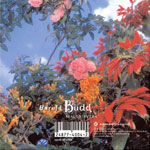

Harold Budd
Avalon Sutra
(Samadhisound)
According to reports, Avalon Sutra is the final release from Harold Budd, and if that is indeed true, then at the very least he's going out on a strong note. A musician and composer for well over 4 decades, Budd has worked with the likes of Brian Eno and the Cocteau Twins (among others), scored films, and has assembled a large body of work that although somewhat new-agey at times, offers up remarkable consistency and even some great surprises (his By The Dawn's Early Light mixes spoken word, Native American themes, and ambient music like they were always meant to be together).
As mentioned above, one of the criticisms that I've always heard of Budd is that he's simply too soft (or new age, if you will), but let's face it, many of the early 'classic' ambient pieces (including Budd and Eno's Plateaux Of Mirrors, Eno's Music For Airports, etc etc) could easily fall into that category. Budd has shown over the years that he's one of the masters of calm and Avalon Sutra does nothing to break that streak. If anything, it's easily one of the better releases that he's put out, with subtle work from everyone involved to create another soothing release that doesn't relegate itself to wallpaper.
Largely piano driven, the album winds its way through 14 pieces that mix slightly varied instrumentation in a way that helps the album progress very nicely. The three-part "Arabesque" tracks all mingle expressive but subtle piano playing with soft beds of ambient drones and the slightly sharper tones of soprano saxophone played by John Gibson. "It's Steeper Near The Roses (for David Sylvian)" runs barely over a minute long, but is a touching vignette that blends heavily reverbed piano with warm strains of strings. "Little Heart" is almost all sparkling chromatics, as shimmering bells and sparse piano phrases linger over a bed of lush ambience. "Rue Casmir Delavigne (for Daniel Lentz)" strips things down even more as Rhodes chords linger and linger and reflect off more restrained piano playing to great effect.
The closing track of "As Long As I Can Hold My Breath" starts out with piano work that feels a bit more somber than some of the other pieces on the album, but seems to bloom about halfway through into something different entirely as beautiful electronics flutter and rise over a repeating chime pattern, ending the release with a touch of hope. The second disc of the release (simply entitled "As Long As I Can Hold My Breath") finds that final track reworked into one epic seventy minute piece courtesy of Akira Rabelais and Budd, and although it works the same themes over and over, it's absolutely hypnotic and an amazing take on work by Budd. Strings flourish and breath while a repeated ambient background loops wearily and sparse piano notes and phrases fall in and out of the mix. On top of the already great music contained within, the stunning artwork on the release only adds to the attractiveness of the overall package. I guess if Budd has to have a final recording, this is the way to go.
Rating: 8